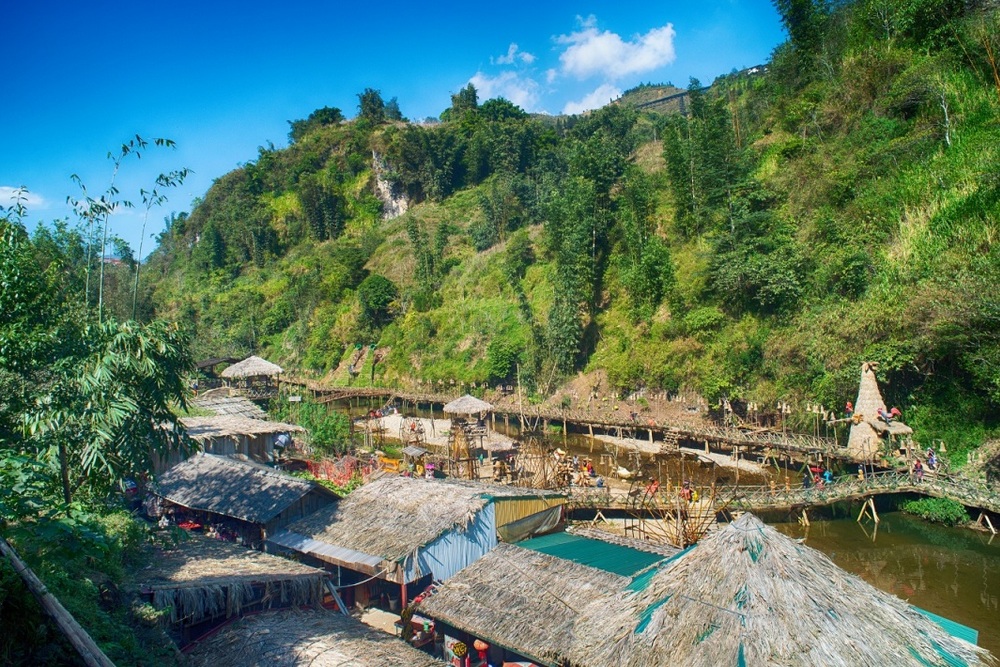越南是一个美丽而多样的国家,为旅行者提供广泛的体验。最受欢迎的时期之一是在八月份,当时该国大部分地区的天气通常温暖而干燥。在这篇博客文章中,我们将探索天气模式 越南在八月,以及一年中这个时候的一些最佳访问场所。
越南地区天气
越南是一个漫长而狭窄的国家,从与中国的北部边界延伸到湄公河三角洲的南端。结果,天气因一个区域而异。通常,越南北部地区往往具有更温和的气候,而中部和南部地区则更为热带。
八月的平均温度

8月,越南的平均温度范围从北部约25°C(77°F)到南部的32°C(90°F)。 NHA Trang和Da Nang等沿海地区由于沿海微风而倾向于稍微凉爽。
- 在河内,八月的平均高温约为32°C(89°F),低温约为26°C(78°F)。
- 在胡志明市,平均高温约为32°C(89°F),低温约为23°C(73°F)。
- 在位于北部山脉的SAPA中,平均高温约为25°C(77°F),低温约为16°C(60°F)。
八月的平均降雨量

八月在越南通常是一个潮湿的月份,该国经历了大量降雨。在一年中的这个时候,中部和南部地区往往会收到最多的降雨量。
- 在河内,八月的平均降雨量约为230毫米,一个月的15天降雨。
- 在胡志明市,八月的平均降雨量约为144毫米,一个月的18天降雨。
- 在位于中央海岸的HOI AN中,八月的平均降雨量约为300毫米,一个月的20天降雨。
尽管降雨增加了,但八月期间越南的天气通常仍然温暖而阳光明媚,有很多机会享受户外活动并探索该国的自然美景。
八月在越南访问的最佳场所

越南凭借其各种景观和气候,为旅行者提供了很多机会在8月份探索。这是一年中这个时候在越南访问的一些最佳地方:
河内
作为越南的首都,河内是一个繁华而充满活力的城市,提供了古代和现代文化的独特融合。八月,河内的天气通常温暖而潮湿,平均温度范围从26°C(78°F)到32°C(89°F)。
河内的顶级景点之一是旧区,这是一个人口稠密的社区,是迷宫狭窄的街道和历史建筑的家园。游客可以在热闹的市场中徘徊,品尝美味的街头食品,并探索该市的许多寺庙和宝塔。
河内的另一个必看的吸引力是胡志明陵墓,游客可以向心爱的前总统致敬。附近的胡志明博物馆还对这个革命人物的生活和遗产进行了令人着迷的眼光。
对于那些想逃避城市炎热和人群的人来说,风景秀丽的霍恩·基姆湖及其周围的公园提供了宁静的绿洲。游客可以在湖上悠闲地漫步或乘船,并欣赏历史悠久的Ngoc Son Temple的壮丽景色。
萨帕
萨帕(Sapa)位于越南北部山脉,是一个风景如画的小镇,提供与该国其他地区的气候和景观截然不同的城镇。 8月,SAPA的平均温度范围从约16°C(60°F)到25°C(77°F),使其成为流行的低地热量和湿度。
SAPA的主要景点之一是令人惊叹的自然风光,包括Hoang Lien Son Mountain Range的高耸的山峰和点缀周围山坡的梯田稻田。游客可以踏上各种徒步旅行和徒步旅行冒险,探索该地区的各种生态系统,并参观土著少数民族群体的偏远村庄。
除了其自然风光外,SAPA还以其充满活力的本地市场而闻名,访客可以浏览各种手工艺品,纺织品和其他传统产品。该镇的丰富多彩而活泼的市场是与当地人民互动的好地方,并更多地了解该地区丰富的文化遗产。
对于那些希望放松和恢复活力的人,SAPA还提供一系列的水疗和健康设施,以及舒适的山地旅馆和旅馆,可从日常生活的喧嚣中宁静静修。
宁平
Ninh Binh位于越南北部,以其令人惊叹的自然美景和独特的文化景点而闻名。八月,忍者的天气通常温暖潮湿,平均温度范围从26°C(79°F)到33°C(91°F)范围范围范围范围约为26°C(79°F)。
Ninh Binh的顶级景点之一是一个风景秀丽的景观综合体,这是一个联合国教科文组织世界遗产,其中设有蜿蜒的河流,高耸的石灰石悬崖和郁郁葱葱的绿色景观。游客可以通过乘船游览宁静的水道,或者穿过周围的山丘和山谷来探索这个令人惊叹的自然奇观。
Ninh Binh的另一个必看的吸引力是Hoa Lu的古老首都,这是越南历史上多个王朝的权力所在地。游客可以探索旧城堡的废墟,以及散布着景观的许多寺庙和神社。
对于那些对该地区丰富的文化遗产感兴趣的人来说,拜顿宝塔是必不可少的目的地。这个庞大的佛教寺庙建筑群是越南最大的综合体之一,具有复杂的建筑,令人印象深刻的雕像和宁静的氛围,邀请游客反思和冥想。
除了其自然和文化景点外,Ninh Binh还以其美味的当地美食而闻名,该美食包括各种新鲜的海鲜,丰盛的汤和芬芳的米饭。
会安
Hoi An位于越南中部海岸,是一个迷人而历史悠久的小镇,以其保存完好的建筑,充满活力的市场和令人惊叹的自然环境而闻名。 8月,HOI AN的天气通常温暖潮湿,平均温度范围从25°C(77°F)到33°C(91°F)范围范围范围范围约为25°C(77°F)。
HOI AN的主要景点之一是该镇历史悠久的老城区,该城镇被指定为联合国教科文组织世界遗产。游客可以在狭窄的街道上漫步,欣赏五颜六色的建筑物,传统商店和标志性的日本覆盖桥。
HOI和HOI的另一个必看景点是该市繁华的中央市场,这是活动的枢纽,也是品尝当地美食的好地方。游客可以浏览摊位和讨价还价的供应商,从新鲜农产品和海鲜到手工制作的工艺品和纪念品的所有事物。
对于那些希望逃脱镇上热量和人群的人来说,旁边的邦海滩是游泳,晒日光浴和享受宁静的沿海风景的热门目的地。参观者还可以探索周围的乡村,包括风景如画的稻田和Thu Bon River的宁静水道。
除了其自然和文化景点外,Hoi An还以其蓬勃发展的艺术和手工艺品的景象而闻名,其中包括各种讲习班和画廊,展示了当地工匠的作品。
芽庄
Nha Trang位于越南中南部海岸,是一个受欢迎的海滩目的地,以其令人惊叹的自然美景,充满活力的夜生活和温暖,热带气候而闻名。八月,NHA Trang的天气通常炎热潮湿,平均温度范围从约27°C(81°F)到32°C(90°F)。
NHA Trang的主要景点之一是该市美丽的海滩,该海滩以柔软,金色的沙子和清澈的水域而闻名。游客可以度过自己的日子,在温暖的海洋中游泳,并享受各种水上运动,例如浮潜,潜水和摩托艇。
除海滩外,Nha Trang还以其充满活力的文化景点而闻名,其中包括Po Nagar Cham Towers,这是一个历史悠久的印度教寺庙综合大楼,可追溯到7世纪。游客还可以探索这座城市繁华的市场,尝试美味的当地美食,并体验活泼的夜生活场景,该场景以其活泼的酒吧,俱乐部和娱乐场所而闻名。
对于那些希望逃避人群并探索该地区自然美景的人,NHA Trang还提供各种一日游和游览,例如前往附近岛屿的船游览,并参观Vinpearl Resort and Aquarium。
胡志明市
作为越南最大的城市,胡志明市(也称为西贡)是一个繁华,充满活力的目的地,提供了现代和历史景点的独特融合。八月,胡志明市的天气通常炎热潮湿,平均温度范围从约23°C(73°F)到32°C(90°F)。
Ho Chi Minh城市的主要景点之一是历史悠久的统一宫殿,该宫殿在越南战争期间担任南越政府的总部。游客可以探索宫殿的各个房间和办公室,以及地下战争掩体和指挥中心。
胡志明市的另一个必看的吸引力是战争残余博物馆,该博物馆提供了越南战争对国家及其人民的影响的清醒且令人发人深省的观察。访客可以了解各种战斗和战斗以及冲突的人为成本。
对于那些希望体验城市充满活力的文化景象的人来说,熙熙benh thanh的市场是一个很好的探索场所。这个标志性的市场是活动的枢纽,摊位提供各种商品,从新鲜农产品和街头食品到手工制作的手工艺品和纪念品。
除了其历史和文化景点外,胡志明市还以其繁荣的食物和饮料场景而闻名,包括各种餐馆,咖啡馆和酒吧,展示了越南最好的美食和夜生活。
减少拥挤和成本
八月访问越南的优势之一是,该国通常比旅游季节的高峰季节不那么拥挤。对于希望避免在该国许多顶级景点上常见的大批人群和长队的旅行者来说,这可能是特别有益的。
除了减少人群之外 八月前往越南 由于许多酒店,航空公司和旅行社在低季节提供折扣价和特殊促销活动,因此也可以更具成本效益。对于旅行者来说,这是一个很好的机会,可以节省旅行并以更悠闲的速度探索该国。
八月穿什么
什么时候 八月访问越南,重要的是要打包轻便,透气的衣服,以帮助您在温暖,潮湿的天气中保持凉爽和舒适。一些推荐的物品包括:
- 短袖衬衫或轻巧的上衣
- 轻巧,脱干的裤子或短裤
- 舒适的脚趾步行鞋
- 轻便,可包装的雨衣或雨伞
- 宽边帽子或防晒霜以防止阳光
- 防晒霜和太阳镜
如果您打算在海滩或游泳池旁度过一段时间,最好打包泳衣和轻巧的掩盖。此外,重要的是要保持水分并全天喝大量水,以帮助对抗热量和湿度。
结论
越南是一个真正杰出的国家,拥有各种各样的景观,文化和经验,可以为游客提供。虽然八月的天气在该国许多地区可能炎热潮湿,但仍然有很多机会探索和享受该国的自然美景和文化财富。
无论您是有兴趣参观历史城市,穿越令人惊叹的山景或在美丽的海滩上放松身心,越南都可以提供每种旅行者的东西。那么,为什么不计划您在八月的下一次越南之旅,并发现这个令人惊叹的国家所能提供的一切呢?




